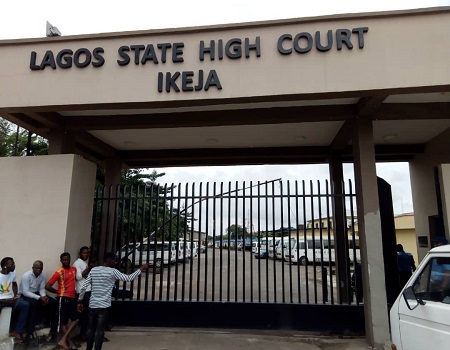Kemisola Oye
ACCESS to Justice (A2J) has described an order of a Lagos High Court ruling restricting the planned public protests to two places as ‘unfortunate and reputational harm to not just the Lagos judiciary, but the Nigerian Judiciary.’
Justice Emmanuel Ogundare of Lagos High Court had on Tuesday (yesterday) issued injunctions restraining persons associated with the 1-10 August 2024 planned protests from “converging and carrying out their proposed peaceful public protest, rallies, procession and meetings in Lagos State from the 1-10″ August except in the approved designated location for peaceful public protest, rallies and meetings, to wit: Gani Fawehinmi Freedom Park, Ikorodu Road, Ojota, Lagos State and Peace Park Ketu Lagos from 8 .00 am to 6 pm pending compliance with the pre-action protocol by the Claimant.”
The convener, Access to Justice, Mr Joseph Otteh, has, however, described the ruling as unfortunate and capable of inflicting considerable reputational harm to not just the Lagos Judiciary, but the Nigerian Judiciary.
The group said the order of the court undercut principles universally regarded as fundamental to the exercise of judicial power as well as the normative contents of globally recognised rights.
He said the court makes orders which substantively determine how a person’s rights may be exercised not temporarily, but substantively without giving such persons the right to a hearing. He noted that it is a rudimentary principle, elemental to the exercise of all judicial power that every person is entitled to be heard before any orders are made against him.
He said the court restricts the manner fundamental rights can be exercised without legal justification. He cited the provision of Section 45(1) of the 1999 Constitution of Nigeria which provides that the right to freedom of expression may be restricted by a “law” that is reasonably justifiable in a democratic society (a) in the interest of defence, public safety, public order, public morality or public health; or (b) to protect the rights and freedom or other persons.
“As far as we know, there was no law made or cited to the court based on which the court could curtail the exercise of a fundamental right guaranteed by the Constitution. Had such a law even been made, the court would be further required to assess whether the law is reasonably justifiable in a democratic society.
“A court is bound to engage in this interlocking legal analysis before it can validly restrict the enjoyment of a constitutional right. Unfortunately, in this case, the court did not, and acted as though a government had the right, arbitrarily, wily-nilly, to request an injunction to limit the exercise of a right without reference to any legal standards.”
Access to Justice, therefore, stated that the “Court failed, in a rather deplorable manner, and at a time when the judiciary’s ability to safeguard civil liberties is being tested, to exercise the role the Constitution has reserved for the Judiciary, which is to act as a bulwark against arbitrariness and tyranny.
“Orders like the ones this court has made will surely raise eyebrows and trigger profound questions of the independence and impartiality of this court and, indeed, Nigerian courts. It is very plausible to argue that a truly independent court, conscious of its constitutional role, will not make orders which limit the exercise of fundamental rights the way this court has done.”
On the Nigerian Bar Association’s (NBA) position on the protests, the group described it as a “Kick in the Gut” for the rule of law.
He said the NBA intervention in the planned hunger protests #EndBadGovernanceInNigeria is starkly dissuasive, with the body arguing that the protests could “have a devastating effect on the country” and could, like the #EndSARS protest, have a “negative impact on the economy.” The NBA President instead called for the “voice of reason to prevail now.”
“The NBA’s position on the protest is misplaced; its voice echoes for the wrong candidate and its weight is behind the lesser ’cause’. As an organisation founded to defend the rule of law.”
Otteh said the Bar ought to be more concerned with expanding civic spaces for the expression of civil rights, and to defend those who desire to exercise those rights within constitutional boundaries, and it is hardly the place of the Bar to justify why citizens ought not to exercise their rights, particularly when it notes that there is “widespread hunger in the land”.
“The NBA ought to rally behind citizens whose rights to protest the widespread hunger in their land are being threatened with widespread force and intimidation, from both governmental and non-governmental sources and prevent the government from muzzling dissent.
“The Nigerian Bar misinterprets its role if, rather than ensuring that citizens have the protection, security and space they need to ventilate their grievances and seek the amelioration of their difficult economic conditions, it sides with those whose interests are to preserve the strangulating status quo.”
Access to Justice, therefore, called on government, the law enforcement and security forces to let the people of Nigeria express their voices and state their case in any shades of colour or strides of motion they choose.
“This is an obligation governments owe its citizens under the Constitution and several regional and international treaties, instruments and standards.”
Eighteen-Eleven Media


